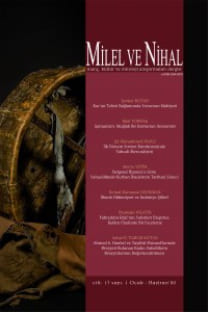Geçmişten Günümüze Yahudi Düşüncesinde Kudüs
Kudüs’ün Yahudi tarihindeki yerinin Kral Davud ile
başlamış olmasına rağmen İbrahim’e Tanrı tarafından ebedi mülk olarak vaat
edildiğine inanılmıştır. Ayrıca şehir, mabedin burada olması itibariyle Yahudi
dini hayatının merkezinde olmuştur. Bununla birlikte Yahudiler, Babil
sürgününden sonra -Haşmoniler dönemi hariç tutulursa- hep başka devletlerin
kontrolü altında yaşamışlardır. Bu bağlamda çeşitli dönemlerde içinde
yaşadıkları kültürle sahip oldukları gelenek arasında kaldıklarında neler
yaşadıkları ele alınmış ve Yahudi düşüncesinde Kudüs’ün tarih içindeki farklı
yorumlanma biçimlerine işaret edilmiştir
Anahtar Kelimeler:
Kudüs, Siyonizm, aydınlanma, sekülarizm
Jerusalem from the Past to the Present in Jewish Thought
Although
Jerusalem began its place in Jewish history with King David, it was believed
that it was promised to Abraham as eternal property by God. In addition, the city
was at the center of Jewish religious life as the temple was here. However, Jews always
lived under the hegemony of other states after the Babylonian exile, except Hasmoneans
period. In this context, it was
discussed what they experienced when they were between the culture they lived
in and their tradition in various periods and was pointed out different
interpretations of Jerusalem in Jewish thought throughout history.
Keywords:
Jerusalem, Zionism, enlightenment, secularism,
___
- Adkins, Curtis E.; Jerusalem: The Chosen City Seven Studies on the Symbolism of the City, (Unpublished Ph. D. thesis, Fuller Theological Faculty, 2011). Aleichem, Sholem; Stories and Satires, London: Hardcover, 1999. Aykıt, Dursun Ali; Hıristiyanlığın Öncüsü Olarak İskenderiyeli Philo, İstan-bul: Kitabevi Yayınları, 2011. Armstrong, Karen; Jerusalem One City Three Faith, United States Of Ameri-ca: Ballantine Books, 1996. Copulsky, Jerome Eric; Between Exile and Redemption: Political Theology and the Shaping of Modern Jewish Thought, (Unpublished Ph. D. thesis, University of Chicago, 2005). Gürkan, Salime Leyla; “Yahudi Geleneğinde Reform Arayışları”, Milel ve Nihal: inanç, kültür ve mitoloji araştırmaları dergisi, 5, 2, 2008, ss. 147-159. Hengel, Martin; Judaism and Hellenism, John Bowden (trans.), Philadelp-hia: Fortress Press, 1981. Josephus, Flavius; The Works Of Josephus, William Whiston (trans.), Ame-rica: Hendrickson, 1999. Kaufmann, Francine ve Eisenberg, Josy; “Yahudi Kaynaklarına Göre Yahudilik”, Din Fenomeni, Mehmet Aydın (çev.), Konya: Din Bi-limleri Yayınları, 2000. Kollek, Teddy; “Present and Future”, Council on Foreign Relations, 59, 5, 1981, s. 1041-1049. Kurt, Ali Osman; Fundamentalist Yahudiler, Ankara: Eski Yeni Yayınları, 2016. Maimonides, Moses; The Guide For The Perplexed, M. Friedlander (trans.), London: Routledge&Kegan Paul, 1951. Mendelssohn, Moses; Jerusalem or on Religious Power and Judaism, Allan Arkush (trans.), Massachusetts: Brandeis University Press, 1983. Özen, Adem; Yahudilikte İbadet, İstanbul: Ayışığı Yayınları, 2001. Özmen, Seda; “Reform Yahudiliğinin Pittsburgh ve Columbus Platform-ları Bağlamında Değişen Kutsal Topraklara Dönüş İnancı”, İsraili-yat: İsrail ve Yahudi Çalışmaları Dergisi, 2, 2018, ss. 82-101. Philipson, David; “The Frankfort Rabbinical Conference 1845”, The Jewish Quarterly Review, 18, 2, 1906, ss. 251-290. Philo, F. H. Colson (trans.), Massachusetts: Harward Press, 1985. Rabkin, Yakov M.; “Judaism: The Search for Peace in the Holy Land”, Holy Land Studies, 10, 2, 2011, ss. 139–168. Raphael, Marc Lee; “Rabbi Jacop Voorsanger of San Francisco on Jews and Judaism: The Implications of the Pittsburgh Platform”, Ameri-can Jewish Historical Quarterly, 63, 2, ss. 185-203. Sanders, E. P.; Judaism Practice & Belief 63 BCE-66CE, London: SCM Press, 1992. Shmueli, Efraim; “The Jerusalem School of Jewish History”, American Academy for Jewish Research, 53, 1986, ss. 147-178. The Apocrypha, New York: Thomas Nelson&Sons, 1804. The Babylonian Talmud, (eds. ) Isidore Epstein, London: The Soncino Press, 1935. The Five Books Of Maccabees, Henry Cotton (trans.), Oxford: Oxford Uni-versity Press, 1832. www.ccarnet.org/rabbinic-voice/platforms/article-declaration-principles/(03.02.2019). www.ccarnet.org/rabbinic-voice/platforms/article-guiding-principles-reform-judaism/(03.02.2019).
- ISSN: 1304-5482
- Yayın Aralığı: Yılda 2 Sayı
- Başlangıç: 2003
- Yayıncı: Milel ve Nihal: Eğitim, Kültür ve Düşünce Platformu Derneği
Sayıdaki Diğer Makaleler
Kudüs Katliamı Bağlamında Haçlı Seferlerinin Sebepleri
Geçmişten Günümüze Yahudi Düşüncesinde Kudüs
Tasavvuf Düşüncesinde Metafiziksel Bir Eksen Olarak Kudüs Algısı
Beytülmakdis’in İşgali ve Bilgi Krizi
İsrail’in Kudüs Politikasının Dini Nedenleri Üzerine Bir Analiz
Bir Arada Yaşama Bağlamında Hz. Ömer Döneminde Kudüs
Allâme Şeyhî Efendi’nin Kudüs Temalı Şitâiyyesi veyahut “Karlar İçinde Bir Kudüs Tasviri”
